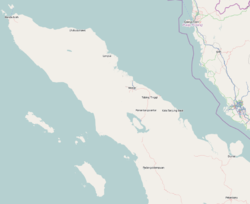Lhokseumawe
|
Lhokseumawe Lhôk Seumaw‘è |
||
|---|---|---|
| City | ||
| Other transcription(s) | ||
| • Jawi | لهوکسيوماوي | |
|
||
| Motto: Kota Petro Dollar($) | ||
 |
||
| Location of the city in northern Sumatra | ||
| Coordinates: 5°11′17″N 97°8′25″E / 5.18806°N 97.14028°ECoordinates: 5°11′17″N 97°8′25″E / 5.18806°N 97.14028°E | ||
| Country | Indonesia | |
| Province | Aceh | |
| City Founded | 21 June 2001 | |
| Government | ||
| • Mayor | Suaidi Yahya | |
| • Vice | Nazaruddin | |
| • Secretary | Bukhari Mahmud | |
| Area | ||
| • Total | 181.06 km2 (69.91 sq mi) | |
| Elevation | 2-24 m (−77 ft) | |
| Population (2014) | ||
| • Total | 180,200 | |
| • Density | 1,000/km2 (2,600/sq mi) | |
| Demographics | ||
| • Languages |
Indonesian (official) Acehnese |
|
| City Growth | ||
| • HDI | 77.23 | |
| • GDP | Rp. 10.598.205.71 (Million Rupiah) | |
| Time zone | WIB (UTC+7) | |
| Area code(s) | +62 645 | |
| For Official Government Website see below of this page | ||
Lhokseumawe (Indonesian: Kota Lhokseumawe, Acehnese: Lhôk Seumaw‘è, Jawi: لهوکسيوماوي), is the second largest city in Aceh Special District, in the north of Sumatra, Indonesia. The city covers an area of 181.06 square kilometres, and had a population of 171,163 at the 2010 Census; the latest official estimate (as at 2014) is 180,200. Being between Banda Aceh and the large southern city of Medan, the town is a key regional centre important for the economy of Aceh.
The name of Lhokseumawe came from the words "Lhok" and "Seumawe". "Lhok" means deep, bay, ocean trenches and Lhokseumawe means the swirling water in the sea along the offshore of Banda Sakti and its surroundings. The city was formerly part of North Aceh Regency, The existence of this region can not be separated from the emergence of the kingdom Samudera Pasai around the 13th century, the area later became part of the sovereignty of Sultanate of Aceh since 1511.
The Sultanate of Aceh was established by Sultan Ali Mughayatsyah in 1511. Later, during its golden era, in the 17th century, its and political influence expanded as far as Satun in southern Thailand, Johor in Malay Peninsula, and Siak in what is today the province of Riau. As was the case with most non-Javan pre-colonial states, Acehnese power expanded outward by sea rather than inland. As it expanded down the Sumatran coast, its main competitors were Johor and Portuguese Malacca on the other side of the Straits of Malacca. It was this seaborne trade focus that saw Aceh rely on rice imports from north Java rather than develop self sufficiency in rice production. After the Portuguese occupation of Malacca in 1511, many Islamic traders passing the Malacca Straits shifted their trade to Banda Aceh and increased the Acehnese rulers' wealth. During the reign of Sultan Iskandar Muda in the 17th century, Aceh's influence extended to most of Sumatra and the Malay Peninsula. Aceh allied itself with the Ottoman Empire and the Dutch East India Company in their struggle against the Portuguese and the Johor Sultanate. Acehnese military power waned gradually thereafter, and Aceh ceded its territory of Pariaman in Sumatra to the Dutch in the 18th century.
...
Wikipedia


